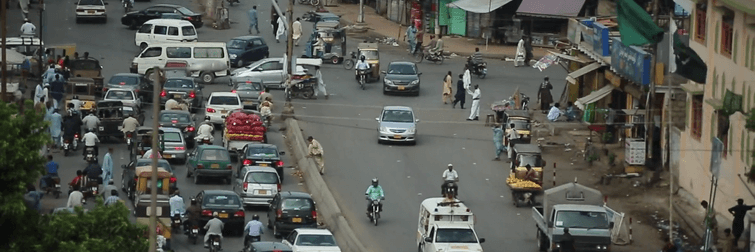
blog: Improving the liveability of Karachi through BRT
Wednesday 7th August 2019
Since the end of 2014, ITP has played a crucial role in transport proposals to improve the liveability of one of the world’s least liveable cities – Karachi. Using our expertise in all aspects of developing public transport we have taken the Karachi Bus Rapid Transit (BRT) scheme from preliminary design through to the start of the procurement process – and intend to take it further.
About the scheme
The Karachi Bus Rapid Transit Red Line Project will deliver 26.6-kilometer (km) of BRT corridor and associated facilities benefiting as many as 1.5 million people, about 10% of Karachi’s population who live within a kilometer of a Red Line BRT station. More than 300,000 passengers per day are expected on the Red Line BRT routes.
The project will restructure the entire width of the Red Line BRT corridor, including the construction of 29 stations and dedicated lanes along the 26.6 km stretch; improvement of the mixed-traffic roadway with up to six lanes in each direction; inclusion of on-street parking and landscaped green areas in various locations; improvement of the drainage system to climate-proof the corridor; and installation of non-motorized transport infrastructure such as bicycle lanes, improved sidewalks, and energy-efficient street lights.
The project will also establish sustainable BRT operations in Karachi by improving the capacity of relevant transport authorities; designing the BRT business model and subsidy-free operations; implementing a bus industry transition program, including a fleet scrapping program and compensation mechanism; developing an effective public communications campaign; and delivering the BRT fleet, feeder e-vehicles, intelligent transport system, and a biogas plant.
Key milestones
This July the Asian Development Bank (ADB) approved a $235 million loan to help develop Karachi’s BRT system with state-of-the-art energy and climate resilience features that will enhance quality public transport for the people of Karachi, Pakistan’s largest and most populated city.
ADB’s financing will be supplemented by two $100 million loans from the Asian Infrastructure Investment Bank and the Agence Française de Développement to jointly finance the project’s civil works and equipment costs.
Over the past four and a half years, ITP has provided wide-ranging expertise covering:
- Policy reform and support to on-going institutional and organizational development in the urban transport sector in Sindh – setting visions and goals; organizational frameworks; inter-organizational processes; and a roadmap to establishment of new organizations to manage Karachi’s, and Sindh’s, public transport
- Preliminary design and cost estimates – value engineering of previous studies; data collection and analysis; engineering drawings and specifications; detailed cost estimates
- Full due diligence – environmental safeguards (impact, mitigation and management); social safeguards (including resettlement processes and procedures, poverty, gender, disability); economic and financial viability; security and risk assessment
- Operations finance model – assessing current context for public transport provision; creating, running and analysing financial models; demand forecasts; fare policies and strategies
- PPP assessment – covering proposals to attract private sector financing
- Project implementation road map – investment and finance plan; implementation arrangements
Next steps
ITP’s success in these components led to it being commissioned to lead the next phase of scheme development leading to implementation including:
- Project Management – from master programming, risk analysis, quality management, procurement planning, budget and cost control, audits and project reporting
- Procurement support – ensuring that all procurement of works, goods and services for the Project are completed satisfactorily to meet the overall schedule for the start of BRT operations
- Institutional development and capacity building – building on, and completing, previous organizational development plans; developing and implementing organizational development plans to ensure efficient and effective management, operation and maintenance of the BRT system when completed; strengthening and building capacities of relevant organizations related to BRT operations
- Project communications – communicating information about BRT and associated improved public transport services to raise the awareness of BRT, and to gain the public's support for and involvement in the BRT development, and use of the BRT once operational – with carefully planned strategies using all media
- Community awareness and participation programme – providing a framework for the public of Karachi to be made aware of the project as a whole, to obtain its views and ensure these views are considered in the project design process.
Along with ADB, ITP is committed to achieving a prosperous, inclusive, resilient, and sustainable public transport system in Karachi.
If you're interested in working on projects like this one, we are looking for someone with 8+ years' experience to join our International Team. Click here to find out more about the job role and its requirements.
